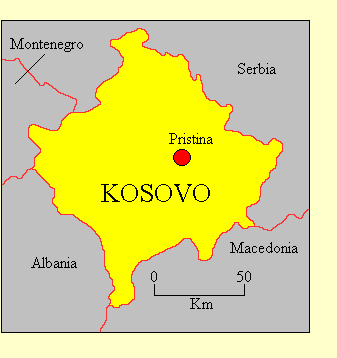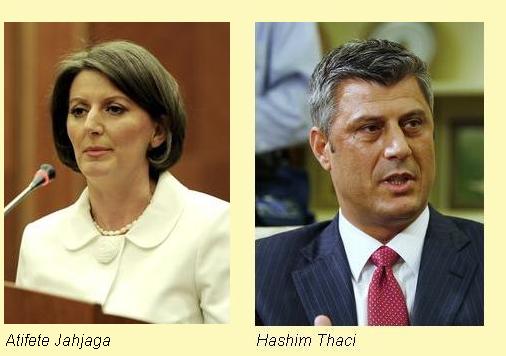
REPUBLIC OF KOSOVO• Official name: Republika e Kosova, Republika Kosovo (Republic of Kosovo)
In 1945 Kosovo became an Autonomous Region of the Republic of Serbia within the Federal Socialist Republic of Yugoslavia, which meant in effect that the position of the Albanians as the majority community in Kosovo was officially recognised. When Yugoslavia disintegrated in the 1980s, the Serbian nationalists who seized control in Belgrade tried to re-assert Serbian control over Kosovo. In 1989 Kosovo's autonomous status was revoked, and Slobodan Milolevic's Serbian regime increasingly resorted to repression to enforce Serbian rule. This naturally led to Albanian resistance, and in 1996 open warfare broke out, leading to the Serbian attempt to expel the entire Albanian population (some 2 million people) by force. This led to NATO intervention, including the bombing of Belgrade, and in 1999 Serbia withdrew and allowed a NATO force to occupy Kosovo, which was then placed under UN administration. The moderate Albanian leader Ibrahim Rugova, leader of the Democratic League of Kosovo (LDK), became president of an elected interim government, but following his death in 2006 more militant nationalists came to the fore. At the 2007 elections, two nationalist parties, the Democratic Party of Kosovo (PDK) and the Alliance for the Future of Kosovo (AAK) won 44% of the vote and were able to form a government with the support of minor parties. The PDK leader Hashim Thaci became Prime Minister, and Kosovo declared its independence on 17 February 2008. Currently 85 states have recognised Kosovo's independence, including the US, Britain, France and Germany. Serbia, backed by Russia, refuses to accept Kosovo independence, and as a result Kosovo is not a member of the UN or most other international organisations. Freedom House's 2011 report on Kosovo says: "Kosovo is not an electoral democracy... Kosovo’s December 2010 parliamentary elections were the most problematic of any held in the post-1999 period. Reported irregularities included family voting (in which the male head of a household casts ballots for the entire family); vote buying; a lack of freedom of movement for ethnic minorities; and limitations imposed on women in rural, patriarchal social environments... Corruption is a serious problem, even by regional standards... A May 2010 report by the International Crisis Group (ICG) noted that "organised crime and corruption are widespread and growing"... The 2008 constitution protects freedoms of expression and the press, with exceptions for speech that provokes ethnic hostility... The constitution guarantees religious freedom, and ethnic Albanians, who are predominantly Muslim, enjoy this right in practice. There have been outbreaks of systematic attacks on Orthodox Christian churches and other sites associated with the Serb population... Freedom of assembly has occasionally been restricted for security reasons, and the constitution includes safeguards for public order and national security... Kosovo's constitution calls for an independent judiciary, but courts at all levels are subject to political influence and intimidation." Updated November 2011 |
